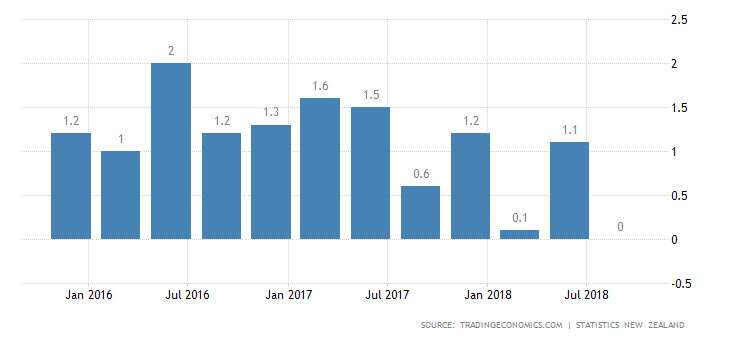Consumer spending in New Zealand slowed down in the third quarter as retail sales fell more than expected. Official data from Statistics New Zealand showed that retail sales were flat in the three months ending September 2018.
The data fell short of the market expectations which forecast an increase of 1.0% on the quarter. The weaker than expected report briefly pushed the Kiwi down to a 12-day low.
On a seasonally adjusted basis, which excludes the effects of fuel prices, retail sales rose by 2.7% on a volume basis on an annual rate. Another measure of retail sales, the core retail sales rose 0.4% on the quarter, which was again below estimates of a 1.5% increase.
Source: Tradingeconomics.com
Sue Chapman retail statistics manager at Statistics New Zealand said, “The rise in fuel sales was offset by falls in the food and beverage and the vehicle industries this quarter.”
Compared to the previous quarter, both headline and core retail sales showed a weaker than expected sales during the period.
The data indicated a slow patch in consumer spending as consumers held off from buying food and motor vehicles. The data underscores the Reserve Bank of New Zealand’s monetary policy where it has held the official cash rate unchanged for more than a year.
The central bank has also maintained a neutral tone as it turned cautious signaling the risks to the growth outlook. This could now also include the moderate consumer spending which surprised amid a string of strong economic reports.
Recent reports showed that the labor market conditions were tighter and amid continued government support and rising wages, incomes would also increase, leading to higher retail spending.
However, this was not the case, and the data shed a gloomy shadow for the retail spending for the fourth quarter. However, on the flipside, as consumers held back from spending in the third quarter, a spending splurge could be expected in the three months ending December.
However, higher fuel prices were seen to be affecting activity in the broader retail sales sector. Supermarket and grocery store spending declined by 0.2% on a volume basis. These two sectors account for more than 20% of the spending volume.
Automobile sales fell by 2.3% or about 1.7% including price movements. Meanwhile, the volume of fuel sales rose 0.5% with rising prices pushing the fuel spending as high as 7% on the quarter.
“The notable increase in the value of fuel sales coincided with the start of the Auckland regional fuel tax and record pump prices,” Sue Chapman said in a statement.
Spending on motor vehicle parts was down by 1.3% to NZD 3.33 billion during the quarter. This was the only sector that registered a decline regarding value. Overall, spending on automobile parts was down by 0.1% during the quarter.
The next RBNZ meeting is scheduled for only in January next year. By then, the central bank will also have the third-quarter GDP report, which is due to come out later in December this year.
Given the current state of the economy and mixed signals, the RBNZ is quite likely to maintain its status quo on interest rates for the considerable period.
The RBNZ Governor, Adrian Orr was speaking at an event on Wednesday last week. However, the central bank chief did not make any references to monetary policy. Instead, he brushed aside speculation about the central bank targeting housing price inflation.
In the near term, the Reserve Bank of New Zealand will be seen holding rates steady, and the markets hope for some signs of a rate hike only towards the latter part of next year.
